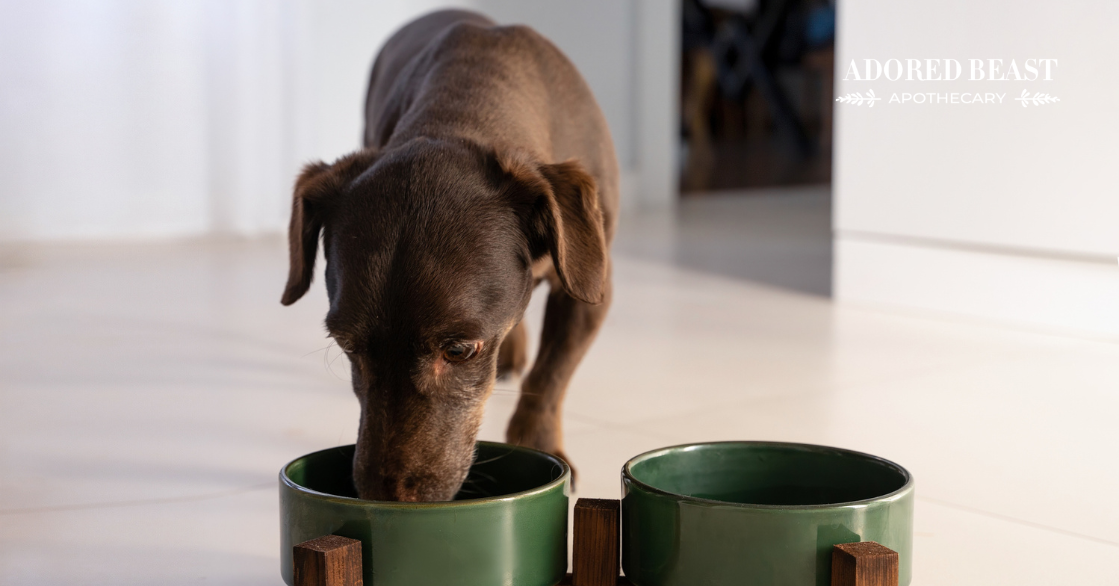For hundreds of years, Native Americans have used slippery elm bark for its beneficial and soothing properties.
The slippery elm is a large, deciduous tree native to Eastern North America. It’s also sometimes called red elm or grey elm. The part of the tree that contains therapeutic properties is the inner bark.
When you mix the bark with water, it creates a sticky material known as mucilage. And when it comes to slippery elm for dogs, this mucilage provides a wealth of benefits in a variety of situations.
Slippery Elm for Dogs
There are several reasons we’re big fans of slippery elm for dogs, but our favourite, by far, is soothing digestive upset. And the most well known use of slippery elm for dogs is to help with digestive issues.
Your dog’s digestive tract can become inflamed for a variety of reasons – something they ate, bacteria, a food sensitivity, medications, or a chronic issue like leaky gut. And when this happens, you’ll often see a variety of symptoms, perhaps the most common of which are vomiting, diarrhea, and acid reflux.
For this reason we always keep it on hand for our families, furry and not so furry, when tummy troubles spring up.
Herbalists have long celebrated the virtues of slippery elm as a digestive helper. This is largely thanks to its ability to act as a demulcent. Demulcent plants contain a polysaccharide molecular complex called mucilage (we mentioned it above). When this mucilage comes in contact with water, it turns into a slimy, gel-like substance. And this gel is magical…
Think about when you apply aloe vera to a sunburn. Right away you get that soothing relief, and you can feel that protective layer forming on your skin. You can almost hear your body saying “ahhh, thank you.”
That’s how your gut (or your dog’s gut) feels when you take slippery elm.
When you ingest the bark, whether on its own or in a supplement, and it makes its way through the body, it’s like it’s coming into contact with water. That same gel-like substance forms and coats the inside of a dog’s digestive tract, lubricating and helping promote mucous secretions. This helps reduce the inflammation within the digestive tract that can cause the diarrhea or vomiting or gastric reflux.
And research confirms this…
The Study on Vomiting and Diarrhea
A 2013 study on the management of canine and feline vomiting and diarrhea tested the efficacy of slippery elm in a veterinary setting.
When dogs were brought into participating veterinary clinics with vomiting or diarrhea, for a variety of causes, the veterinarians (with consent of the pet parents) recommended/prescribed slippery elm. They then tracked progress after the dogs left the clinic.
Here were the results:
- 82% of the dogs in the study with vomiting responded to slippery elm within 2 days or 4 doses
- 93% of the dogs with diarrhea responded to slippery elm within 2 days or 4 doses
Cats were also included in the study and the results were similar: 77% of cats with vomiting and 79% with diarrhea responded to slippery elm within 2 days or 4 doses. That’s why we created a slippery elm product specific for cats – Feline Gut Soothe!
Other Uses for Slippery Elm
Aside from the digestive support, what other ways might slippery elm be beneficial for your pet?
- Slippery elm powder is thought to soothe the lining of the urinary tract. Therefore, it might help alleviate the painful irritating symptoms that come with a urinary tract infection.
- As a mild diuretic, it also helps increase the flow of urine and eliminate waste from the body.
- Research shows that the antioxidant properties can be helpful for inflammatory diseases like inflammatory bowel disease and Crohn’s.
- Because of the mucilage, it can also coat and soothe the throat, respiratory tract, and sinuses. This makes it helpful if your dog has a respiratory issue like a sore throat or cough from conditions like a collapsed trachea, bronchitis or with some sinus and soft palate conditions that brachycephalic dogs (short snouts) can have (ex. bulldogs, bully breeds, shih tzus, pekingese, Boston terriers, etc..). We also like it for cats for asthma.
- Some also recommend it as a soothing addition to a kennel cough home care plan (after you have seen your vet). For more at-home care for kennel cough, read this next.
- Slippery elm also has potential for acid reflux because it coats the esophagus, enhancing reflux stimulation of nerve endings in the gastrointestinal tract, leading to increased mucus secretion. Again, because the mucilage of slippery elm helps to coat the esophagus, it is supportive in the prevention of the irritation and inflammation that occurs when stomach acid flows up the esophagus. If your dog has gastric reflux, it’s important to look at why. Look at diets that decrease acid and supplements to strengthen the sphincter.
How to Give it to Your Dog
You can buy slippery elm for dogs as a single supplement and follow the directions. Typically, dosage guidelines go by weight, and recommendations are 100 milligrams per 10 pounds, two to four times daily. You can mix it into your dog’s regular food, or blend it into a little bit of plain kefir or gentle bone broth.
We’ve added slippery elm to our Gut Soothe, along with things like L-Glutamine amino acid to help support healthy mucous membranes, and pre and probiotics to encourage healthy gut flora and enhance the immune response of the digestive tract.
Slippery elm for dogs has a good safety profile, but we don’t recommend its use with pregnant dogs. Also, because of the protective layer it forms, it may interfere with the absorption of other supplements or medications, so try to give it separate from these, waiting a few hours in between.
Keep some slippery elm on hand for any time your dog has some tummy trouble. Sometimes all it takes is a few goes, and your dog will be right as rain!












